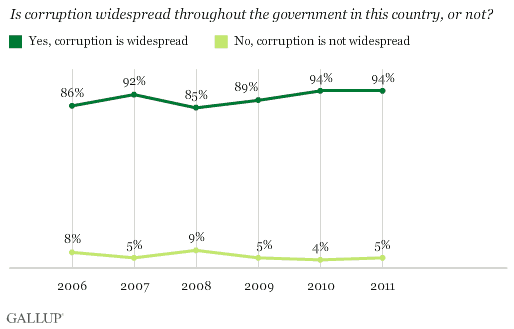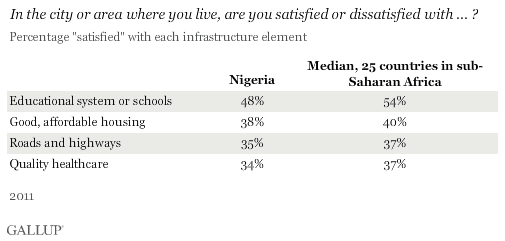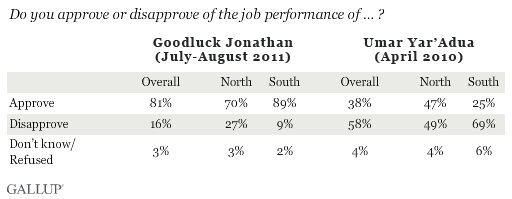WASHINGTON, D.C. -- Widespread protests in Nigeria over the sudden removal of fuel subsidies are putting the spotlight on a government that 94% of Nigerians think is corrupt. Protesters say they view the move -- which has more than doubled fuel prices in Nigeria and prompted a major oil union to threaten a work stoppage that could affect oil prices worldwide -- as further betrayal from a self-serving and unresponsive state.

The government's ongoing failure to address widespread poverty and stimulate job creation likely compounds Nigerians' frustration. Despite Nigeria's considerable oil wealth, basic infrastructure remains severely inadequate in most areas, restricting the potential for business development. Nigerians' likelihood to be satisfied with basic necessities such as roads and schools is no higher than average for countries in sub-Saharan Africa.

Ironically, economists have said the country's fuel subsidy promoted the corruption that Nigerians are protesting against and would have forced the government to borrow heavily from external creditors. Nigerian officials have defended its removal as a way to divert more public spending to infrastructure development. However, the resulting surge in fuel prices and the cost of other goods has shaken a population in which most people struggle to provide basic necessities to their families. In 2011, about 6 in 10 Nigerians (59%) said there had been times in the past year when they didn't have enough money to buy food for their families. Four in 10 (40%) said there had been times when they didn't have enough to provide adequate shelter. Both figures are significantly higher than the median results among countries surveyed in sub-Saharan Africa.
Presidential Overreach
In deciding to remove the subsidy, President Goodluck Jonathan's administration may have overestimated the faith Nigerians would be willing to place in him. The country's acting president since the death of his predecessor Umar Yar'Adua in May 2010, Jonathan received 59% of the vote in the April 2011 presidential election and has enjoyed a measure of personal popularity. Gallup's 2011 poll, conducted in July and August, found that 81% of Nigerians overall approved of Jonathan's job performance, a dramatic rise from 38% when the question was last asked about Yar'Adua in April 2010.

Perceptions of widespread government corruption did not decline at all after Jonathan's election, however, implying that Nigerians make a clear distinction between the performance of individual leaders and the systemic dysfunction that has plagued the country for decades.
Implications
Nigerians' prior optimism about Jonathan's job performance may give him some staying power in the face of this month's social unrest. However, as a member of the ruling People's Democratic Party, he is also the product of a system that Nigerians almost unanimously view as corrupt. To the extent that decisions like the oil subsidy removal are seen as part of the broader pattern of government disregard for Nigerians' well-being, the president's support among the public may quickly fade. The current situation highlights Nigerians' skepticism that meaningful change is possible from within the existing system, and points to the potential for ongoing instability in the country.
Survey methods
Results are based on face-to-face interviews with 1,000 adults, aged 15 and older, in Nigeria conducted July-August 2011. For results based on the total sample of national adults, one can say with 95% confidence that the maximum margin of sampling error is ±5 percentage points. In addition to sampling error, question wording and practical difficulties in conducting surveys can introduce error or bias into the findings of public opinion polls.
For complete methodology and specific survey dates, please review Gallup's Country Data Set details.
Learn more about how the Gallup World Poll works.
